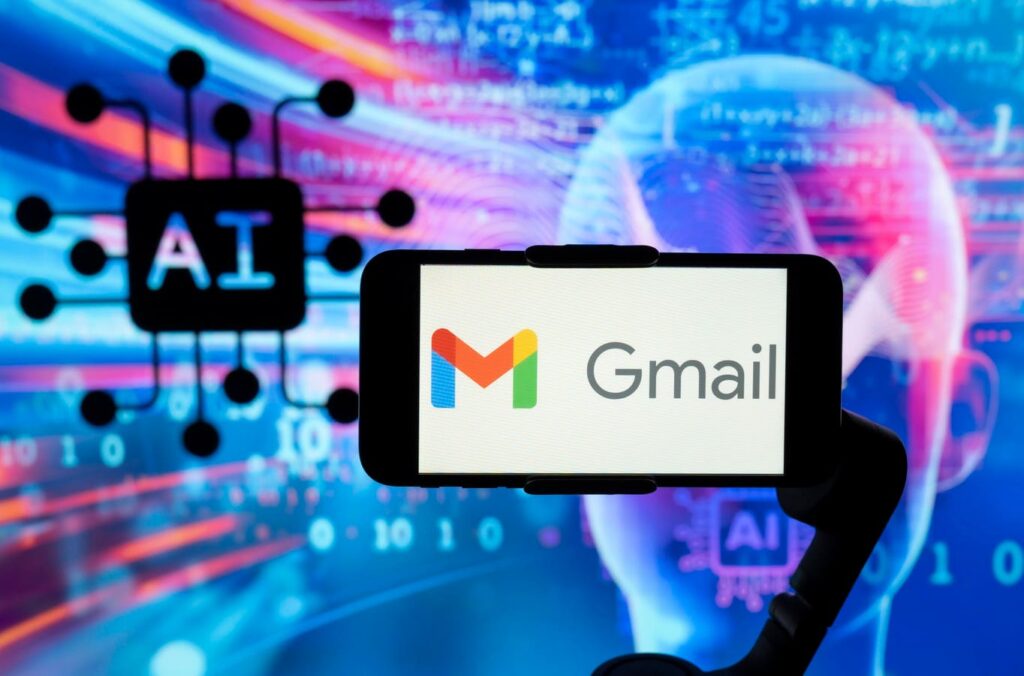A new and dangerous AI threat for all Gmail users is seen in the wild
SOPA Images/LightRocket via Getty Images
Update, Oct. 13, 2024: Following the initial report on Oct. 11, new details have emerged regarding Google’s anti-scam initiatives and its Advanced Protection Program aimed at safeguarding high-risk Gmail accounts.
As Gmail boasts over 2.5 billion users worldwide, it’s no surprise that hackers are turning to increasingly sophisticated AI-driven tactics to target unsuspecting individuals. Here’s what you should know to stay safe.
Beware of AI-Driven Gmail Scams
Sam Mitrovic, a consultant at Microsoft, nearly fell victim to a sophisticated AI scam call that could deceive even the savviest users. The ordeal began when he received a notification requesting approval for a Gmail account recovery attempt. This common phishing tactic lures users into a scandal using fake login portals.
Initially dismissing the notification, Mitrovic soon found himself on the receiving end of a follow-up call from someone posing as Google support. The caller expertly engineered trust, claiming there was suspicious activity on Mitrovic’s account. The sense of urgency and alarming details made it convincing, revealing just how advanced these scams have become.
During the conversation, the caller claimed an attacker had accessed Mitrovic’s account and downloaded sensitive information. Alarm bells rang as he recalled the earlier recovery notification. Despite the address appearing legitimate, a quick search revealed it was not a genuine Google support line but instead linked to Google Assistant. A clever tactic, indeed!
AI Scams Growing More Elaborate
In another instance, Garry Tan, founder of Y Combinator, shared his chilling experience with a similar AI-driven scam. This con artist posed as Google support, even claiming a family member was trying to recover his account. The audacity of the claims highlighted the elaborate nature of these scams. Tan was wise to the tactics and bypassed the trap, ultimately uncovering glaring red flags—such as the dubious nature of device identification during the call.
Creating Legitimate-Looking Scams Using Google Forms
Fraudsters have also started using Google Forms to enhance their scams, presenting themselves more convincingly. By creating legitimate-looking documents that appear to come directly from Google, they trick users into providing sensitive information. A typical tactic is to mimic an account recovery form, often accompanied by SMS notifications purportedly from support agents. This clever “double legitimacy” strategy is a common pitfall for the unsuspecting.
Lessons Learned from Near Misses
Mitrovic managed to sidestep the scam by requesting email verification. However, even the email address initially seemed authentic, complicating matters. The revelation came when he noticed unusual phrasing in the call. It’s crucial to hold onto your skepticism—especially when it comes to unexpected communications.
Had the attacker succeeded, a fake login portal would have likely followed, leading to potential credential theft and bypassed two-factor authentication methods.
Google’s Global Signal Exchange Initiative
In response to these alarming threats, Google has launched the Global Signal Exchange in collaboration with the Global Anti-Scam Alliance and the DNS Research Federation. This initiative focuses on sharing intelligence signals related to scams in real-time, aiming to enhance detection and prevention strategies against fraud.
Amanda Storey, from Google’s Trust and Safety team, highlighted that this partnership harnesses the unique strengths of each organization involved. The objective is to build a system that can efficiently tackle scams on a massive scale, effectively making it easier for organizations to combat these malicious activities.
Proactive Measures to Combat Scams
While these AI scams are alarming, staying calm is crucial. If you receive a call from someone claiming to be associated with Google, remember that legitimate support will not contact you unsolicited. Use trusted resources, like Google’s own services, to verify any claims. Keep a lookout for unusual activity in your Gmail account, and avoid falling for pressures to act hastily. Cyber criminals often exploit urgency to cloud judgment.
Additionally, enrolling in Google’s Advanced Protection Program provides enhanced security for at-risk users, including journalists and activists. Recent updates now allow passkey support, making it easier for users to secure their accounts without the financial burden of purchasing hardware security keys.
This comprehensive protection ensures that even if your username and password are compromised, authentication remains strictly regulated, preventing unauthorized account recovery attempts.
Conclusion
AI continues to evolve, and so do the tactics employed by cybercriminals. By remaining vigilant and informed, individuals can protect themselves from these sophisticated scams. Always take a moment to question unexpected communications, and remember to utilize the robust security practices offered by Google.
The AI Buzz Hub team is excited to see where these breakthroughs take us. Want to stay in the loop on all things AI? Subscribe to our newsletter or share this article with your fellow enthusiasts.




